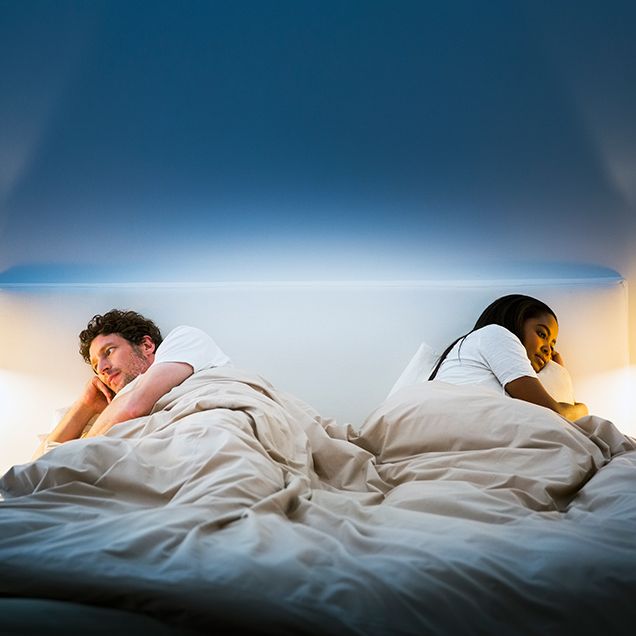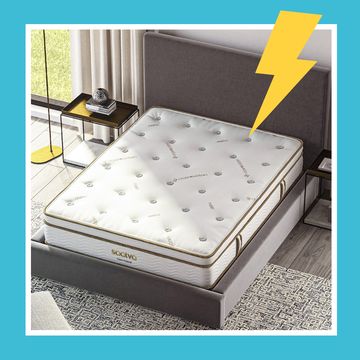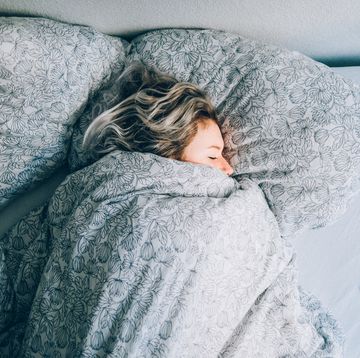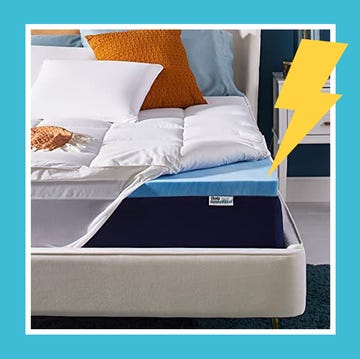Sometimes it feels like sharing your life with a partner is a breeze, compared to sharing your bed. No matter how much you love him or her, chronic sleep issues (let’s hear it for all the snorers) and bad bedtime habits (that means you late night texters) can make snuggling with bae a bit problematic.
Sleep issues can crop up in any relationship, says Michael Breus, Ph.D., a clinical psychologist and fellow of The American Academy of Sleep Medicine. To help you drift off to dreamland without ditching your partner, we asked about the most common sleep problems that plague his patients, plus how to fix them.
Having different sleep schedules is not at all uncommon. But when one person’s alarm goes off, it’s bound to wake the other—not to mention how annoying it is if they hit the snooze a few times. “There’s a definite level of resentment that happens there,” says Breus.
After you’re up, making noise and turning on lights as you get ready for your a.m. workout or an early commute can further ruin your partner’s chance of sleeping in. “If you are getting up dramatically earlier, be aware,” says Breus. “Don’t talk to the dog or turn on the kitchen radio—you forget those things can be really disruptive.”
The Fix: If one person consistently has to get up earlier than the other, start by swapping out your alarm. “You can actually get a vibrating alarm clock that you can put inside your pillow. That way there’s not some blaring alarm that wakes everyone in the room up,” Breus says. These days, a lot of activity trackers also have vibrating alarms that will ease you out of dreamland with a gentle pulse on your wrist.
Besides switching to a couples-friendly alarm, see which parts of your morning routine could be taken care of the night before. “In the evening lay your clothes out in the bathroom so you’re not walking back and forth in the bedroom and making noise,” suggests Breus. “Little things like planning the night before can actually be very helpful in keeping the peace.” (Kick-start your new, healthy routine with Women's Health's 12-Week Total-Body Transformation!)
Snoring isn’t just annoying, it can also totally disrupt your bedmate’s sleep. “There’s actually data to show that if you sleep next to a snoring partner you lose an hour of sleep every night,” says Breus.
The Fix: Solving a snoring issue is tough since it’s not something you can just “cure.” But there are a few tricks you can use to help silence a sleep-disrupting snore.
If you’re the snorer, Breus recommends using an internal nasal dilator like the Mute Nasal Dilator ($15, amazon.com) or mouthpiece from the drugstore (or both), which help with breathing and airflow. You can also “stop drinking alcohol approximately three hours before bed,” says Breus. Since alcohol has muscle-relaxing effects, it tends to make snoring worse. Finally, you can take a decongestant before bed to help clear things up.
If you’re the non-snorer, start by building a pillow wall to block the sleep disrupting sound waves. “You will discover that their snoring doesn’t sound nearly as bad,” Breus says. If that doesn’t work, reach for earplugs or a sound machine. Breus recommends the iHome by Zenergy Bedside Sleep Therapy Machine ($88, amazon.com).
We asked men and women what they think of farting in relationships. Learn what they had to say:
“Generally speaking, people always sleep better in the cold, not the warm,” says Breus. “But there are people who like to keep it toasty.” This can be a major issue if one partner spends every night shivering or the other is sweating. Not ideal.
The Fix: When it comes to setting the temperature of your bedroom, “it’s always better to err on the side of cooler rather than warmer,” Breus says. He recommends setting the thermostat to somewhere between 68 and 72 degrees in the evenings.
Why favor the cool sleepers over those who prefer to snooze at a balmier temp? “It’s easier to get warmer than it is to get cooler," says Breus. If you tend to get chilly at night, put on socks, warmer jammies, or even consider a heating pad for your side of the bed.
If you’re a sweatier sleeper, the best thing you can do to stay cool without freezing out your partner is sleep with your feet outside of the covers, says Breus. “You dissapate heat out of the bottom of your feet faster than any other part of your body.” For an added breeze, put a fan on your side of the bed.
Related: 7 Couples Therapists Share How They Know A Relationship Is Doomed
There’s a reason Goldilocks spent so much time trying out beds—finding the perfect mattress is hard enough when you sleep solo, let alone when you share a bed. “This is always going to be challenging,” says Breus. “Depending on different body types and sleeping styles, different people are going to have different needs.”
The Fix: Sort of like with room temperature, it’s easier to make your mattress softer than it is to make it harder, so prioritize whoever likes a firm mattress when you buy, says Breus. When you get your new mattress home, modify. “Go with a firmer sleep surface and then you can add a one- or two-inch foam topper to one side.”
Related: 'I Bought A $200 Mattress From Amazon—Here's How I've Been Sleeping'
Few bedtime behaviors can be more divisive than wanting to fall asleep to the TV. For some, the background noise is a comfort that helps them drift off to dreamland. For others, the light and late-night chatter is a total sleep saboteur.
The Fix: With a few tweaks, the TV doesn’t have to be the elephant in your bedroom. The first thing to do is make sure you’re using your TV's built in sleep-timer, says Breus. Set it for 30 minutes after bedtime.
If the sound is keeping one of you awake, you can try two things, Breus says: earplugs and pillow speakers. “If you like falling asleep to the TV, they now make Bluetooth speakers that go in your pillow so only you hear the television,” he says.
Finally, make sure to turn the brightness down before bed. And if the light emitted from the screen still screws with your ability to get some shuteye, reach for an eye mask.
Can’t sleep without cuddling your pet? That can cause major problems if you and your partner don’t have the same attitude about your pooch’s proper place. “ If one person just can’t stand animals in the bed and the other person can’t sleep without their pet, you have a real problem,” says Breus.
The Fix: This common sleep problem requires a lot of compromise and communication within the relationship, says Breus. For starters, rather than cuddling with a pet, train them to stay at the end of the bed so it’s less disruptive to your partner's sleep. You can also try to get your furry friend to sleep in a cat or dog bed at the foot of your bed, or on the floor next to you.
Secondly, focus on hygiene. “Change sheets at least every week and keep good airflow in the room so it doesn’t smell like a dog bed,” says Breus.
Related: This One Factor Has A Major Impact On How Often You Have Sex
Sure, getting naked in bed with bae is standard sexy time protocol—but not everyone likes to sleep that way. You might love sleeping au natural but your bedmate might be less enthusiastic about a face full of bare booty first thing in the morning.
The fix: “Talk with your partner if they’re uncomfortable,” says Breus. And maybe even encourage them to try it. “There is data to show that sleeping naked actually is better than sleeping clothed,” says Breus.
If hygiene concerns are the issue (having your partner climb into bed bare-assed after a trip to the bathroom is likely to cause a cringe or two), wash your sheets at least once, maybe twice a week, says Breus. “My patients who sleep naked have a tendency to take their shower or bath in the eve so that’s kind of a nice habit to get into.” The only time sweaty, naked bodies need to be in bed is if you’re about to make them sweaty.
Macaela MacKenzie is a journalist who writes about women and power. She covers women’s equality through the lenses of sports, wellness, and the gender gap across industries and is the author of MONEY, POWER, RESPECT: How Women in Sports Are Shaping the Future of Feminism. Mac was most recently a Senior Editor at Glamour where she directed all health and wellness coverage. Her work has appeared in Elle, Glamour, SELF, Bustle, Marie Claire, Allure, Women's Health, and Forbes among other publications.













